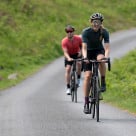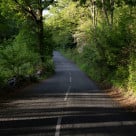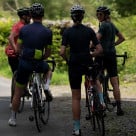![]() Follow britishcycling.org.uk on
Follow britishcycling.org.uk on ![]()
![]()
![]()
![]()
Geoff Bassett - Memories of The First Honorary Secretary
With the organisation's 50th Anniversary celebrations in full swing, we've run a number of articles about the people and events which have made the news over the last five decades, including an exploration of the politics behind the creation of the British Cycling Federation. But you can imagine how excited we were when we received a letter from Geoff Bassett, the Honorary Secretary of the British Cycling Federation from formation in 1959 until the end of 1961, in which he shares his personal memories of the period.
In the late 1930's on the roads of Britain bicycles outnumbered motorcars by something like 20 to one and with the declaration of war petrol was severely rationed. So restricted was the supply that taking into account the cost of tax, licence and insurance the cost per mile was unacceptable and many, probably most, owners laid up their cars fro the duration. As public transport by train, bus and tram was accessible, cheap and efficient this did not impose any real inconvenience or hardship but it certainly gave cyclists a freedom that would now seem impossible. For example I remember riding time trials on major roads in 1941 and seeing only half a dozen cars in 25 miles!
With this traffic density in mind, Percy Stallard, one of the top massed start riders pre-war, with some of his club mates, felt it was opportune to take advantage of the near deserted roads and run massed start cycles races on the open road. As a trial he intended to start with a race from Llangollen to Wolverhampton and applied to the NCU for a permit for the event which he intended to hold late in 1942. The NCU rules prohibited racing on the open road so they turned it down. Stallard and his colleagues held their race, which was observed by the police and gave rise to no objections or problems. The NCU promptly suspended everyone involved, riders and officials. They then did the obvious thing and formed their own road racing organisation which they called the British League of Racing Cyclists.
I still ask myself why the NCU did not issue a special one-off trial permit for the Llangollen to Wolverhampton race, but one has to take into account the different attitude to rules of those days which dictated that any such flexibility would have been impossible.
However, that is how the BLRC came into being and from that point slowly expanded from the Midlands into other parts of the country. H.H.England, the very ‘old school' editor of ‘cycling' described the new organisation as ‘rebels' a term which stuck and was resented by members who felt they were only trying to improve the sport. In fact I recall talking to Ron Kitching in his shop some time in 1943 just before the first BLRC event in Yorkshire when he said "I'm not a rebel, I just want to see racing on the open road!" Which encapsulates to perfection Percy Stallard's original intention?
Despite the opposition, the BLRC gradually developed and by the late 1940s had become strong enough to send riders abroad to compete in races organised by similar dissident bodies in other countries. At that time dissident cycling bodies existed in France and elsewhere throughout Europe, while the Iron Curtain Countries thought affiliated to the UCI, would allow anyone to compete in their events, much to the disapproval of the UCI who, in the post war years, did nothing about it.
Then, after about ten years things became more difficult for the BLRC. The ‘League' had no international recognition and most of the dissident bodies in other countries had by this time disappeared. Moreover, the UCI was by now strictly enforcing the rules which banned members of dissident bodies from competing in UCI events: BLRC participation abroad was practically at an end. Further the League confined its interests to road racing making no provision for time trials and track racing. On the other hand the UCI was pressing the NCU to cater for road racing. Contrary to popular belief the UCI never actually threatened the NCU with expulsion over the issue but simply pointed out that there was no practical reason to forbid racing on the roads. The outcome was the adoption of road racing by the NCU.
And by coincidence this was when the word ‘rebel' duly presented problems to the League. During the war years the League had gathered into its membership a substantial number of true rebels; persons who, though not having a moral objection to military service, absconded when called up under conscription as well as a fair collection of deserters from the forces. The direct result of this was the presence of the police, both civil and military at a surprising number of BLRC races, not to enforce road traffic laws, but to apprehend these offenders!
This and the name ‘rebel' attracted the interest of the anarchists who ally themselves to any organisation likely to oppose existing authority. In the case of the BLRC many of them had little or no interest in cycle racing but rather in undermining the existing structure and their approach was militancy. It was always Percy Stallard's ambition that the BLRC would bring road racing to Britain with proper national and international approval. This did not appear to be the aim of those who gained power in the League and ultimately Stallard, the president, was expelled! It is true that they pretty soon realised this was something of a damaging blunder and his membership was restored, but Percy Stallard, founder of the British League of Racing Cyclist's, never again held senior office!
By the mid 1950s it was evident that the BLRC was no longer a force. For example anyone with ambitions to race abroad needed NCU membership which was denied to members of the BLRC. This and a number of other problems was eased by the Tripartite Agreement, which though by no means perfect, allowed members of both the NCU and BLRC to compete together and which also allowed them to participate in time trials under the rules of the RTTC.
The principle problem that arose from the agreement by the middle of the decade was that higher category riders would choose to compete in events held under the rules of the NCU, leaving BLRC races with fields composed of lower category riders who could not get into NCU events. The benefit of this was that the League events catered for a large number of ordinary enthusiasts, but it brought a financial problem since these events did not attract the sponsorship necessary to support them. To sum up, this left the League with an insoluble financial problem and the inevitable solution was to wind up the BLRC and amalgamate with the NCU.
The task of amalgamating the two bodies would clearly be difficult because of the loyalties involved, but League members had to recognise that the options were amalgamation or bankruptcy and joining up with the NCU was the better choice. The major part o the preparatory work was undertaken by Chippendale, King and Itter, all members of South London clubs and thus able to work closely together, taking the Constitution and Rules of the NCU as a basis for the new organisation, but bringing it up to date in terms of both national and cycling (UCI) law and practice. I must record my own special respect for Charles King's work in drafting the constitution of the BCF which is still virtually unchanged to this day! In addition he produced a detailed Modus Operandi for the implementation of the changes, the closure of accounts and the numerous other actions entailed by company law. Completing the list of personnel involved Eddie Lawton, president of the league became president and, from the Essex Centre of the NCU, I became Honorary Secretary.
The first meeting of the Management committee of the new British Cycling Federation was composed on a 50/50 membership basis with equal numbers from the NCU and BLRC and I clearly recall how, at the first meeting, the delegates from each side sat on opposite sides of the table in the Blackfriars office hardly speaking to those on the other side. The Racing committee started in the same way with each group seated on its own side. After a few meetings the ice had thawed. There was no longer a need for past loyalties; we were all in the same business with the same interests and the same objectives.
Thus ends a very brief note of how and why it all happened. The Federation is now celebrating a jubilee and we were the people who set it up and made it start. Most of the modern names associated with the Federation are people I have never met and who almost certainly have no idea for example that Pete (Itter) won the White Hope Sprint Trophy at the Herne Hill Good Friday Meeting in 1939. Chip Chippendale, Eddie Lawton, Charlie King and I are equally ghosts from the past but without us the organisation known as British Cycling would not exist. I think I may be the last of them still around.
Tony Hewson Replies
BC's own take on "How the BCF Was Formed" is generally fair and accurate, but with one glaring exception. For readers' information, there was never the slightest likelihood of the bicycle being banned in the 1890s ---- such myths are part and parcel of the paranoia that paralysed the NCU and RTTC in the 1930s and led to their intransigency towards road racing. People need to look at some contemporary evidence and use their commonsense. My evidence comes from "The Review of Reviews", a monthly magazine, one of many aimed at the intelligent Victorian middle and upper class reader. An article (15/02/1893) entitled "What Bicycle should I buy?" attests to the popularity of cycling amongst this influential readership.
They and millions more would not have stood for such a tyrannical act as banning the bicycle, an idea supported only by a far-right rural minority. It would have brought about protest and large-scale acts of civil disobedience right across the social classes and made Britain the laughing stock of the world. The growing cycle and tyre manufacturing trade, which contributed solidly to the British economy, employing thousands of people, would have been badly damaged or destroyed. Multiple thousands of employees who at this time commuted on bicycles to work in factories and offices would have had to find alternative, more expensive modes of transport. Banning cycle road racing in the 1890s ---- just conceivable, perhaps? But banning the bicycle itself ----- totally absurd. If this was the excuse used by Bidlake and the anti-road racing clan of 1897, it simply shows how far removed they were from reality.
Turning to Geoff Bassett's "Memories of the First Honorary Secretary", the allegation that the League was composed in wartime of "a substantial number of true rebels" ---- absconders and deserters from the armed services -----Where is Geoff's evidence for these offensive remarks and also for his claim that "at a surprising number of BLRC races (civil and military police were present) not to enforce road traffic laws, but to apprehend these offenders!?" Can Geoff name any of these races? And if there were so many deserters as he claims why wasn't anyone caught? This would surely have been seized on by the NCU/RTTC and reported to the press. I've made extensive enquiries amongst people who know the period well, both ex-NCU and ex-BLRC, and only one name comes up. Just one. No organisation can claim to be perfect. I can name an NCU champion who served a gaol term for fraud and another former track star who "managed" the Hercules professional team in France with his hand in the till and was described by Brian Robinson as a "bandit". On this flimsy evidence should I emulate Geoff and say the NCU had "a substantial number" of crooks in its ranks?
Anarchists? I don't know how many BLRC members Geoff knew personally (probably none!) but in my 9 years of membership I never met a single anarchist or anyone who wasn't anything but passionate about cycle racing. The League's approach to the NCU/RTTC axis was, in fact, a mixture of the iron fist and olive branch. They were dealing between 1942-52 with two dyed-in-the-wool organisations, aided and abetted by Cycling magazine editor England and influential columnist GHS, whose misguided objective was to prevent Continental-style road racing from ever taking root on these shores. Of course, the existing structure had to be challenged ---- how else to proceed? There is an old saying: troublemakers and progress go hand in hand. (Think of the Suffragettes, the Chartists, Nelson Mandela.) In 1952 the NCU saw the error of its ways and reluctantly concluded that the League had won the argument and road racing was a good thing after all. BLRC "militancy/anarchy" in the form of a refusal to back down in the face of NCU/RTTC threats had been necessary to bring them to this point. But from there on, the BLRC resorted to negotiation and compromise (this is all on the written record) ---- and in good faith too.
The temporary resignation of Stallard was not because militants drove him out, as Geoff says. Quite the reverse! It was because he thought the BLRC negotiating team led by Bill Thompson around the time of the Tripartite Agreement wasn't militant enough and had made concessions which would lead to the destruction of the semi-professional racing he had nurtured from 1944 onwards. He was right. (In "Nightmare" p 113-6 I quote Stallard verbatim on this point.)
Three factors drove the NCU to the negotiating table. The BLRC's promotion of the 1951 Daily Express Tour of Britain and Ian Steel's magnificent victory in the 1952 Warsaw-Berlin-Prague Peace Race, team-managed by Stallard, proved immensely popular with cyclists throughout the UK. Large numbers, even whole clubs, began deserting the NCU for the BLRC. At the same time the NCU was losing its top riders to the ranks of semi-professional trade teams (e.g. Bob Maitland, Tiny Thomas, Brian Robinson to the likes of BSA, Viking, Wearwell and Ellis Briggs). The UCI pressured the NCU to come to a settlement, as did the Ministry of Transport, alarmed that with rival bodies vying for dominance the number of road races might suddenly double or treble. As it was they had no need to fear because between 1952-59 races put on by the NCU were few and far between.
It was the NCU/RTTC dirty tricks and black propaganda brigade that lost us the Daily Express Tour of Britain. They spouted the sort of nonsense about "rebels", "anarchists" and "deserters" that Geoff repeats here, throwing in "communists" for good measure.
Bankrupt? The BLRC was no more bankrupt in 1958 than it had been in 1945 or 1952. Most of their grassroots races were self-financing through entry fees and revenue from traders advertising in race programmes. Sponsorship paid for big events such as stage races and the classics. As for the NCU, loss of membership together with contributing to the rising cost of maintaining its ageing tracks forced the sale of its Doughty Street HQ and removal to the cramped, decrepit Blackfriars HQ where the BCF started its life. The BLRC had no such costs. Towards the end of the 50s its membership and income were rising together in tandem. It was the NCU and not the BLRC that was in financial difficulties and amalgamation rescued it from slow but sure economic strangulation. Stallard was opposed to amalgamation because he believed many NCU officials, essentially trackmen and time-trialists, had little real interest in road racing and that in time the Union would go bankrupt. Unfortunately, the MOT was losing patience and for this reason, if no other, the shotgun wedding of amalgamation became inevitable.
Thanks almost solely to the efforts of the BLRC, the right to race on the open road passed into law in 1960 and is now enjoyed by all UK racing cyclists. The RTTC who, despite their intransigent opposition profited equally, have never to this day had the courtesy to say thank you. Geoff does not mention this!
From 1951 onwards the membership of the League was increasingly diluted by the addition of former NCU members who lacked strong allegiance to the ideals of the BLRC. When they participated in the 1958 vote for amalgamation, their aim was a short term one ---- to acquire one single membership and racing licence. Looking back with hindsight at what has happened to UK grassroots road racing since, I wonder if they would still have voted as they did?
Tony Hewson (author of "In Pursuit of Stardom" and "A Racing Cyclist's Worst Nightmare")
More Memories: Members' Memories | 50th Anniversay Home Page
50th Anniversary Merchandise - Buy Online
50th Anniversary Gala Dinner - Tickets & Details
British Cycling, Decade-by Decade:




